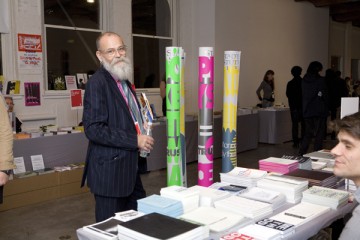This year’s NY Art Book Fair marks the departure of AA Bronson, one of the fair’s original organizers. Bronson resigned from Printed Matter only a few weeks ago, intending to focus on a retrospective of General Idea, of which he is one of the three founding members, along with studying for his Master’s of Divinity degree at Union Theological Seminary. Despite this seismic shift in the art book world, this year’s fair at MoMA PS1 still succeeded in bringing together not only New York publishers but also a wide variety of both young and established book publishers, distributors, antiquarians, booksellers, and artists from all over the world.
The first eye-catcher on the ground floor was the Purple Portfolio, featuring prints by Richard Prince, Terry Richardson, and Juergen Teller, selling for a whopping $25,000 at John McWhinnie at Glenn Horowitz Bookseller. Other high-price, rare books were scattered around at stalls like Anartist, who had Keith Haring ephemera as well as small books and exhibitions catalogues from Christian Boltanski, Mel Bochner, Dan Graham, Richard Serra, Sol Le Witt and Marcel Broodthaers, to name just a few. The latter, as with previous years, continues to prove popular with a number of booksellers, including Banana Books, who also featured his publications. There was a white-glove, ask-before-you-touch affair at the Belgian publisher mfc-michéle didier’s table, with exclusive books by Philippe Parreno and AA Bronson; while Francesco Clemente’s mammoth 50-leave portfolio The Departure of the Argonaut was on sale at Sims Reed for $5,500. Bookseller Marcus Campbell was offering slightly more affordable options by the artist Max Ernst, however. Unbound sheets from the original print run of Une Semaine de Bonte from 1934 were just $20.00 a sheet.
Sales seemed to be going quite well in general — the German publisher Sternberg Press had been finding John Kelsey’s Rich Texts: Selected Writing for Art was particularly popular with visitors and sales had also been going well for other German publishers, including the seasonal interview magazine mono.kultur.
Paul Chan’s table displayed not only his own books as well as sculptures by Cassie Raihl but also presented his four-month-old project, Badlands Unlimited, to the public. With this new venture, Chan aims to turn away from the fetishized physicality of the book to explore the latest publishing technologies such as the iPad and Kindle to create artist’s e-books. Although the first versions are of his own publications, including The Essential and Incomplete Sade for Sade’s Sake, there are plans to work with various other artists to reformat their books as well. Despite not being the only art e-book — a Kindle version of Sargent’s Daughters: The Biography of a Painting by Erica E. Hirshler was promoted upstairs by the distributor ARTBOOK — Chan’s e-books feature interactive media and are innovative through their incorporation of not only text but also enlarged images as well as film.
Inter-college competition was also taking place not only between Yale and the Dutch graphic design school Werkplaats Typografie, but also within the Yale Graphic Design department itself. Both Werkplaats and Investment Future Strategies (the Yale initiative) were operating book exchanges with the intention of extending their own libraries. In response to both of these projects, a number of Yale students had set up a guerrilla campaign on PS1’s steps, where they were giving out their book for free and in which they stated that their book only gained value through an exchange.
Return shipping can be fairly expensive for a lot of the booksellers, to the point where it’s often not worth shipping them back, so getting rid of leftovers just before leaving is not uncommon. Often this amounts to destroying books to sustain their exclusivity and therefore their value. 100%, another renegade project with a stall outside of the museum’s concrete walls, managed to take advantage of this system instead and were selling cast-offs from last year with old copies of Afterall and Artforum for just $1.00.
However, the fair wasn’t just about making sales or exchanges. The AAAARG Library, an online research tool redistributing thousands of books and essays, featured a specially-commissioned project with an old-fashioned card catalog that indexed the content of the website. Those unfamiliar to the website were offered the opportunity to become acquainted with AAAARG by filling out a form and requesting an article that would then be emailed on to them. Old school meets new school. Although, new school is proving somewhat inefficient…I’m still waiting for my Bataille text.
